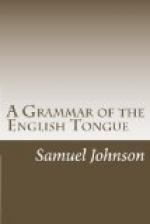Ch, in some French words not
yet assimilated, sounds like sh, as
machine, chaise.
C, according to English orthography,
never ends a word; therefore we
write stick, block, which
were originally, sticke, blocke. In such
words c is now mute.
It is used before l and r, as clock, cross.
D.
Is uniform in its sound, as death, diligent.
It is used before r, as draw, dross; and w as dwell.
F.
F, though having a name beginning with a vowel, is numbered by the grammarians among the semivowels, yet has this quality of a mute, that it is commodiously sounded before a liquid, as flask, fry, freckle. It has an unvariable sound, except that of is sometimes spoken nearly as ov.
G.
G has two sounds; one hard, as in gay, go, gun; the other soft, as in gem, giant.
At the end of a word it is always hard, as ring, snug, song, frog.
Before e and i the sound is uncertain.
G before e is soft, as gem, generation, except in gear, geld, geese, get, gewgaw, and derivatives from words ending in g, as singing, stronger, and generally before er at the ends of words, as finger.
G is mute before n, as gnash, sign, foreign.
G before i is hard, as give, except in giant, gigantick, gibbet, gibe, giblets, Giles, gill, gilliflower, gin, ginger, gingle, to which may be added Egypt and gypsy.
Gh in the beginning of a word has the sound of the hard g, as ghostly; in the middle, and sometimes at the end, it is quite silent, as though, right, sought, spoken tho’, rite, soute.
It has often at the end the sound of f, as laugh; whence laughter retains the same sound in the middle; cough, trough, sough, tough, enough, slough.
It is not to be doubted, but
that in the original pronunciation gh has
the force of a consonant deeply
guttural, which is still continued
among the Scotch.
G is used before h, l, and r.
H.
H is a note of aspiration, and shows that the following vowel must be pronounced with a strong emission of breath, as hat, horse.
It seldom begins any but the first syllable, in which it is always sounded with a full breath, except in heir, herb, hostler, honour, humble, honest, humour and their derivatives.
It sometimes begins middle
or final syllables in words compounded, as
blockhead; or derived from
the Latin, as comprehend.
J.
J consonant sounds uniformly like the soft g, and is therefore a letter useless, except in etymology, as ejaculation, jester, jocund, juice.
K.
K has the sound of hard c, and is used before e and i, where, according to English analogy, c would be soft, as kept, king, skirt, skeptick, for so it should be written, not sceptick, because sc is sounded like s, as in scene.




